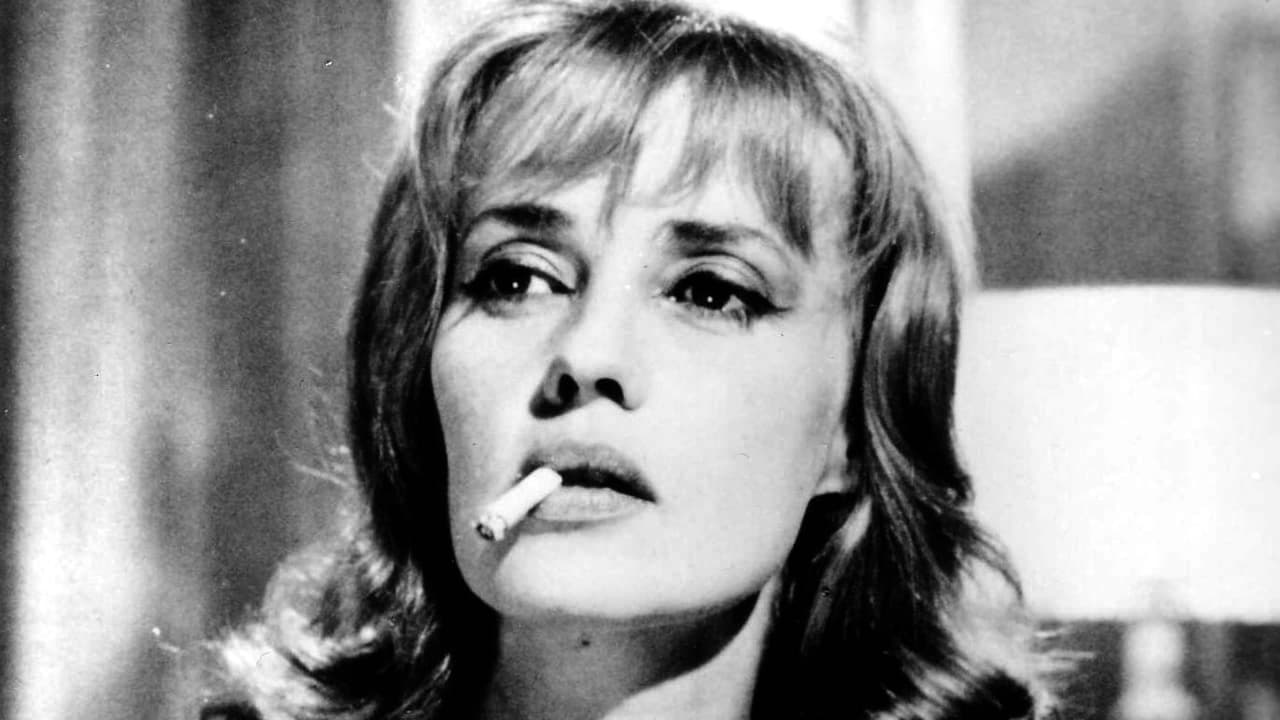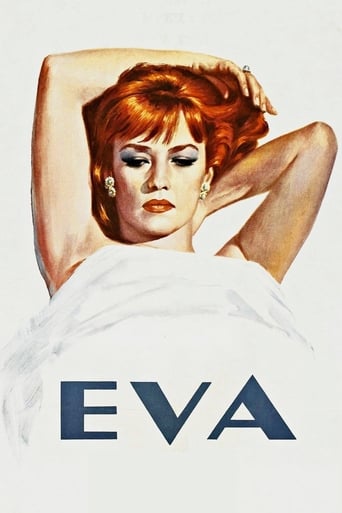



The greatest movie ever made..!
This story has more twists and turns than a second-rate soap opera.
View MoreThere is, somehow, an interesting story here, as well as some good acting. There are also some good scenes
View MoreThe tone of this movie is interesting -- the stakes are both dramatic and high, but it's balanced with a lot of fun, tongue and cheek dialogue.
View MoreA French Italian co-production; here we have Losey attempting to create a Felliniesque European Art House movie with hints of Nouveau Vague. Losey uses Jeanne Moreau to sell what is a concoction of 1950s and 60s art house clichés where character and story development are virtually non-existent. Nothing made me want to engage with the movie, and after an hour I just had to give up. Stanley Baker is appallingly cast as the leading man, the script is dreadfully wooden, and the unremitting jazz score does not hide the fact that this series of clichés just does not work as a film. If this is interesting only for film studies students, then maybe the people writing the courses should seriously ask themselves why - Losey made many better movies and the European Art House scene of the 50s and 60s has far better examples of ground breaking cinema. A great big pretentious yawn of a film that should have been strangled at birth.
View MoreTwo distinctly dislike-able characters circle one another amid the nicely photographed Venice and Rome locations; unable to break away, unable to be together it seems, but wrecking the lives of those around them. It's a promising scenario, a glamorous setting, a combination of strong cast, top name director and highly rated cinematographer. One could easily imagine Antonioni at the helm with Monica Vitti and Marcello Mastroianni as the stars. But it's not them and it really doesn't work. In the male lead role Stanley Baker is well cast as an out-of-place writer from the Welsh Valleys who's made it big with one book and now lives on an Island near Venice, the new darling of the in-crowd. He's big, bluff and rugged with undeniable presence and a convincing aura of potential violence. He isn't exactly nice to know, but you get the feeling that the right woman could bring him round. Virna Lisi as his fiancée is that woman. A Beautiful, fragile, extremely desirable character, she clearly loves him despite being well aware of his many flaws. So what on earth Baker's character finds in love-rival Eva is the huge stumbling over which this whole movie falls. Disbelief can only be suspended to a degree. Eva isn't the sort of woman to bring out the best in anyone. She's clearly supposed to be some kind of irresistible sexual predator who the ex coal miner cannot resist but she's portrayed as frankly repellent. A pouting, scornful, self obsessed gold-digger who plays off lovers against pretend-husbands. She treats Baker's character with taunting disdain at every turn and yet he follows her like an eager lap-dog. Her character might, just might, have worked if an actress of spectacular sexual allure had been cast. Instead Eva is played by Jeanne Moreau. She's a fine actress but she has nothing of the Machiavellian Femme Fatale that the role absolutely demands. Take a look at the poster/DVD sleeve photo of her with cigarette dangling from a sour, down-turned mouth. It's clear this is an actress who's screen persona is more Bette Davis than Brigit Bardot - more Rachael Roberts than Julie Christie. She plays the role with conviction but cannot communicate the essential level of sex-appeal to make the story work, even when the demure camera work teases us with extended near- views of her undressing(this is an early 60s film, so explicit it's never going to be, a lot of wardrobe doors and bath taps are strategically positioned) it all just looks more sordid than sexy. It's just not her role and no amount of beautifully filmed scenes of a wintry Venice, or glamorous parties, or stylised interiors or Alfa Romeo sports cars can overcome that. There is also some poor direction of the actors - of Baker in particular, who gets a bit too over- Shakespearian in his emoting at times (early on - the hand clawing at the face...no Stan, you were better than that, much better) and a few scenes which are simply too set-up to be plausible.In the end its not a film that holds the attention, the characters are too unsympathetic to feel any connection with and although there are moments of poetry , as a whole it's a plodding misfire. My apologies to all fans of Miss Moreau - no offence, very few actresses could have made this role work.
View MoreI had always appreciated Stanley Baker's presence in a film but having watched him in three major roles in a brief space of time - this, HELL IS A CITY (1960) and THE CRIMINAL (1960) - I realize how undervalued his talents are nowadays! This, naturally, makes me even more incensed to have missed out on the R2 SE of another notable film of his - HELL DRIVERS (1957) - which went unceremoniously out-of-print after having been available for barely a year!! Though not a great beauty, Jeanne Moreau manages to make her character's essential irresistibility to men convincing, while her relationship with Baker - turning eventually into humiliation - makes for undeniably compelling drama. Losey gave the two stars uncharacteristic freedom here to get under their respective characters' skin and explore their various idiosyncracies (apart from utilizing records of the era, Eve's obsession with jazz music is also reflected in Michel Legrand's original score) - which probably resulted in the film's overgenerous length (originally 155 minutes!) and its subsequent butchering by the producers - Robert and Raymond Hakim, who had previously worked with Jean Renoir on LA BETE HUMAINE (1938) and would go on to produce Luis Bunuel's BELLE DE JOUR (1967)! The film, however, also allows lovely Virna Lisi to shine with her sympathetic portrayal of Baker's tragic girlfriend (later wife).The film's uncompromising look at the jaded jet-set may have been inspired by Federico Fellini's LA DOLCE VITA (1960) - who, in turn, borrowed EVA's cinematographer Gianni Di Venanzo for his masterpiece 8½ (1963)! I especially enjoyed the film's Venetian backdrop (though it occasionally relocates to Rome): Baker is ostensibly a writer whose first novel has been turned into a motion picture, which is being presented at the world-renowned Film Festival - where, ironically, Losey's own film was declined and which I had the good fortune to attend myself a couple of years ago!! Besides, the funeral-on-the-water scene reminded me of Donald Sutherland's premonition of his own death in Nicolas Roeg's DON'T LOOK NOW (1973), also set in Venice. I don't know how faithful the film is to James Hadley Chase's source novel but its plot of an arrogant, selfish man brought down by an even more cold-hearted femme fatale certainly recalled two masterful screen versions of the Pierre Louys novel "La Femme Et Le Pantin" made by a couple of my favorite directors - Josef von Sternberg's THE DEVIL IS A WOMAN (1935) and Luis Bunuel's THAT OBSCURE OBJECT OF DESIRE (1977) - but, while still managing to make all their points beautifully, those films were much more fun! That said, I appreciated the film even more on a second viewing via the shorter released version (also because much of the detail had been rather obscured in the murky - and, apparently, sole-surviving - print of the longer cut, complete with forced Scandinavian subtitles): while I knew that certain scenes had been removed, I can't say that I particularly missed them; however, I was surprised to see additional footage incorporated into this version that was missing from the 119-minute cut and especially a scene (which actually constitutes one of my favorite moments in the film!) where Baker stumbles and wounds his hand which Moreau finds amusing - their relationship having soured considerably by this point - and he responds by punching her in the face!! Despite having previously made a handful of excellent films, EVA was Joseph Losey's first bona-fide attempt to break away from genre movie-making and branch out into the art-house scene: as such, the film is not only a key work in his oeuvre but also one of his most personal. It's a pity that it turned out to be such a bitter experience, with Losey subsequently disowning the 103-minute "Producers' Version" but, given that his original cut had been shorn by over 50 minutes, that's perfectly understandable. Unfortunately, that complete version seems now to be lost forever...
View More"Eva" is based on a novel by James Hadley Chase, the British writer of American "tough-guy" novels. Director Joseph Losey overlays a cryptic story of alienation and obsession, and the beautiful photography makes the life of the film seem simultaneously glamorous and lonely.But inside this modish story of a not-very-admirable man and the evil woman he falls in love with is a rollicking old noir screaming to be let out, with Robert Mitchum and Jane Greer as the femme fatale.Contemporary Hollywood-style, one-thought-at-a-time storytelling is conspicuously absent here. The audience has to work to connect the dots in this film - there's no directorial hand on the back of your neck, turning your head to look at this road sign, then that, then the other. A requirement of active audience effort was once taken for granted, but is now much more rare and may be an unfamiliar experience for some viewers.Jeanne Moreau is compulsively watchable (as always) as a woman who thinks, but we rarely know about what. The improbably handsome Stanley Baker has the time of his life acting for once, rather than punching someone's chin every twelve minutes, as in most of his films. Virna Lisi has dignity and consequence as the good girl whose love is never valued enough.The underlying story of the film is a classic fantasy of male self-justification - man chases the wrong woman, one who treats all men badly because she can. The man lets himself be led around by his privates, he thinks with the wrong part of his body, and then he blames the hash he makes of things on the "evil" woman (see Adam's explanation to God in the Garden of Eden story). Another predessor of the film is Hogarth's The Rake's Progress.Who the other characters are and what their motivations might be are minor questions - they are peripheral figures who only serve to focus the film on the central issues of male weakness and female inscrutability. The eternal question, "What do women want?", is enough to destroy the unstable male protagonist, and we watch him unravel in the beautifully photographed surroundings of Venice and Rome. The admirable letterbox transfer looks particularly seductive on a big-screen TV.If you ever wondered what a film might look like that combined "The Blue Angel," "L'Avventura" and "Out of the Past," this is about as close as you'll get. Recommended to all except the most passive viewers.
View More